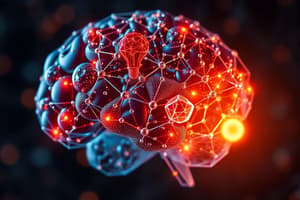Podcast
Questions and Answers
What part of the brain is responsible for thinking, planning, and language?
What part of the brain is responsible for thinking, planning, and language?
- Temporal lobe
- Prefrontal cortex (correct)
- Occipital lobe
- Cerebellum
What is a mental image?
What is a mental image?
Picture-like representations that stand in for objects or events.
What is a concept?
What is a concept?
A mental grouping of similar objects, events, ideas, or people.
What is a prototype?
What is a prototype?
Define hierarchy.
Define hierarchy.
What is an algorithm?
What is an algorithm?
Define heuristic.
Define heuristic.
What is the mental set?
What is the mental set?
Define functional fixedness.
Define functional fixedness.
What is confirmation bias?
What is confirmation bias?
Define belief bias.
Define belief bias.
What is the availability heuristic?
What is the availability heuristic?
Define representativeness heuristic.
Define representativeness heuristic.
What is framing?
What is framing?
Define overconfidence.
Define overconfidence.
Match divergent and convergent thinking with their definitions:
Match divergent and convergent thinking with their definitions:
Differentiate phoneme and morpheme:
Differentiate phoneme and morpheme:
Differentiate receptive and productive language:
Differentiate receptive and productive language:
Who is Noam Chomsky?
Who is Noam Chomsky?
What is the language acquisition device?
What is the language acquisition device?
Define universal grammar.
Define universal grammar.
Who is B.F. Skinner?
Who is B.F. Skinner?
What is linguistic determinism?
What is linguistic determinism?
What is cooing?
What is cooing?
Define babbling.
Define babbling.
What is telegraphic speech?
What is telegraphic speech?
Flashcards are hidden until you start studying
Study Notes
Cognition and Intelligence Key Terms
-
Prefrontal Cortex: Part of the frontal lobe associated with higher-order thinking, planning, and language processing.
-
Mental Image: Visual representations that symbolize objects or events.
-
Concept: A cognitive category that groups similar objects, events, ideas, or people.
-
Prototype: The best or most typical example of a particular category.
-
Hierarchy: A system organized by levels of rank or importance.
-
Algorithm: A systematic, logical process guaranteeing the solution to a problem, in contrast to faster but less reliable heuristics.
-
Heuristic: A simple thinking strategy that aids in judgment and problem-solving, usually quicker but potentially more error-prone than algorithms.
-
Mental Set: The inclination to approach problems in a habitual way, often based on previous success.
-
Functional Fixedness: The tendency to view objects only in their conventional use, hindering problem solving.
-
Confirmation Bias: The inclination to favor information that confirms existing beliefs while dismissing contradictory evidence.
-
Belief Bias: Pre-existing beliefs can distort logical reasoning, leading to mistaken conclusions.
-
Availability Heuristic: Estimating event likelihood based on memory availability; vivid instances are perceived as common.
-
Representativeness Heuristic: Assessing likelihood based on how well something matches a prototype, potentially overlooking other relevant information.
-
Framing: The presentation of an issue impacts decision-making and judgment significantly.
-
Overconfidence: The tendency to be more certain than accurate, leading to inflated confidence in one's beliefs.
Thinking and Language Development
-
Divergent vs. Convergent Thinking: Divergent thinking generates creative solutions through broad exploration, whereas convergent thinking focuses on finding the single correct answer to standard questions.
-
Phoneme vs. Morpheme: Phonemes are the smallest sound units in a language distinguishing meaning (like 'b' or 'p'), while morphemes are the smallest grammatical units carrying meaning, such as prefixes.
-
Receptive vs. Productive Language: Receptive language refers to understanding spoken or written language, while productive language pertains to speaking and writing skills.
-
Noam Chomsky: Proposed that language acquisition is innate, highlighting that humans have an inherent ability to develop language regardless of environmental factors.
-
Language Acquisition Device: Chomsky's idea of a prewired brain mechanism enabling children to learn language naturally.
-
Universal Grammar: Chomsky’s theory that no language is inherently superior in complexity; all humans have the capacity to learn any language without formal instruction.
-
B.F. Skinner: Behavioral psychologist known for developing techniques to manipulate behavior through reinforcement observed through the Skinner box.
-
Linguistic Determinism: Benjamin Whorf's hypothesis positing that language shapes the way individuals think.
Language Development Stages
-
Cooing: From 6-8 weeks, infants start producing simple vowel sounds, typically reflecting contentment.
-
Babbling: Occurs around 4 months when infants begin producing nonsensical sounds spontaneously.
-
Telegraphic Speech: Early language use characterized by short sentences that include only essential words, omitting less critical grammar.
Studying That Suits You
Use AI to generate personalized quizzes and flashcards to suit your learning preferences.




